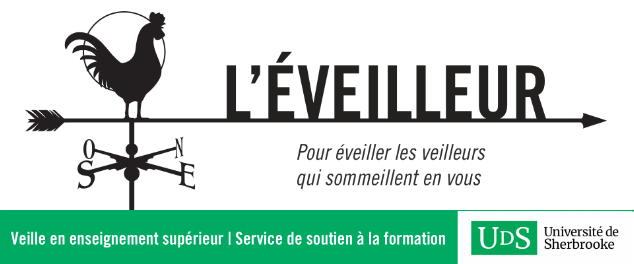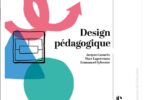Article de fond du Chronicle of Higher Education sur le competency-based learning à l’américaine (différent de ce que nous entendons par « approches par compétences») qui sort peu à peu des marges pour devenir un phénomène important:
“Although massive open online courses have generated far more public fascination, competency-based learning may transform higher education more. For a century, degrees have been built on how much time people spend sitting in class. Competency shifts that. It redefines academic progress according to the learning that students demonstrate. It also puts them at the center of the educational experience, placing much of the burden of learning on them. In the process, it takes faculty members out of their role as teachers, turning them into coaches, curators, and graders. Colleges risk becoming little more than credential-stampers.” (Barrett, 2014)
Notons que la façon de concevoir les compétences dans ces programmes est différente de notre conception québécoise francophone:
« …[C]e sont des compétences à l’américaine ; la notion de compétence telle qu’on l’entend généralement ici renvoie à des libellés bien plus globaux que celui que l’on donne en exemple, qui englobent les modalités de formation prévues. […] …[L]e niveau de détails donné dans l’exemple [voir ci-dessous: Women’s Studies 102] est fort impressionnant; pour la reconnaissance des crédits (et la valorisation de la formation universitaire, notamment pour faire reconnaître des cours individuels)… » (Catherine Vallières, courriel, 23 juillet 2014)
« Women’s Studies 102
Traditional learning goal
Understand the social construction of gender
Competency
Student explains the theoretical concept of the male gaze and its application to visual media by taking quiz/test that asks students to understand the key arguments/basic ideas of Laura Mulvey’s “Visual Pleasure and Narrative Cinema”; short essay question in which students apply Mulvey’s concept of the “male gaze” to a pre-selected film/film excerpt.
Sources: U. of Wisconsin Colleges’ academic-literacy resources and curriculum map »
De telles approches ont été traditionnellement utilisées aux États-Unis pour permettre à des étudiants adultes de venir chercher un complément de formation – en ligne ou en présentiel – dans des programmes professionnalisants. Or, voici que des Liberal Arts Colleges s’y mettent. Dans l’article, on donne les exemples de Northern Arizona University, University of Wisconsin, Brandman University, DePaul University, Westminster College, etc. Or, l’adaptation de cette méthode aux sciences humaines ne va pas de soit:
“Historically, competency programs have been heavily tilted toward practical and applied fields, many of which are guided by standards set out by industry or state licensing boards. Such a focus fits well with the model’s approach, which relies on clearly defined outcomes students must demonstrate through assessments.
[…]
That legacy has led some professors to argue that competency programs are a poor fit for the often contested and ambiguous nature of the liberal arts, and the humanities in particular. You can’t stamp a certification on the suppleness of one’s intellect. Many faculty members would also prefer to evaluate students in more-nuanced ways, on the basis of class discussions and open-ended assignments.
[…]
…[T]he model overlooks key ingredients that make an education worthwhile, like the intellectual maturation that comes with the passage of time and the mind-enhancing experience of grappling with the diverse perspectives of students in a classroom.” (Barrett, 2014)
La méthode confronte les professeurs qui n’ont presque plus de contacts avec les étudiants – un rôle dévolue aux tuteurs et coachs – , mais deviennent essentiellement des experts-contenus qui développent les programmes, les exercices et évaluent le travail des étudiants en donnant davantage de rétroaction:
“Many professors prize their relationships with students and see education as a shared journey. Competency programs can make these things feel obsolete. After all, if Ms. Pollock [une étudiante] can finish as much of a bachelor’s degree as quickly as she has, and mostly on her own, what does that say about the value of exchanging ideas with professors and other students, or the role of time in fostering intellectual growth? Are these parts of a college education as vital as we thought they were?” (Barrett, 2014)
“Even if they are not in a classroom or moderating a class chat, some professors in Wisconsin see themselves as present in the educational process. “We’re still there,” says Kim Kostka, a chemistry professor on Wisconsin’s Rock County campus and coordinator of the competency-based program in arts and science. “We’ve baked ourselves into the curriculum.” (Barrett, 2014)
La question qui demeure est “Est-ce que des étudiants peuvent apprendre de cette façon?” Qui sont les étudiants qui peuvent être rejoints par cette méthode?
“…How many autodidacts are there who can read Simone de Beauvoir’sSecond Sex and think about it from different perspectives without listening to other students or engaging in give-and-take with a professor?
“Most people need teachers,” says Holly J. Hassel, a professor of English and women’s studies at the campus in Marathon County. “That’s just reality.”
[…]
There may not be many students who can complete a liberal-arts curriculum by essentially teaching it to themselves. But they deserve a shot at earning a diploma, say advocates of competency-based learning.
This group of students, however small, may also represent a new market for competency-based learning. If so, it could mark an important moment in the process of disruption.” (Barrett, 2014)
Source: Berrett, Dan, « College, on Your Own », The Chronicle of Higher Education, 14 juillet 2014





